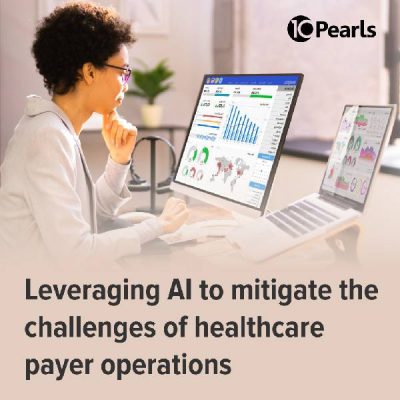Practical AI Solutions in Healthcare That Deliver Real Value
By 10Pearls editorial team
A global team of technologists, strategists, and creatives dedicated to delivering the forefront of innovation. Stay informed with our latest updates and trends in artificial intelligence, advanced technology, healthcare, fintech, and beyond. Discover insightful perspectives that shape the future of industries worldwide.
As the hype around AI solutions in healthcare settles, leaders across the industry are turning inward to evaluate where AI can be implemented to drive meaningful impact within their teams and organizations.
While bold ideas tend to dominate the conversation, real-world adoption remains relatively slow. This disconnect stems from an industry-wide focus on AI projects that promise to reinvent healthcare entirely while overlooking the immediate, practical applications that could address today’s most obvious operational challenges.

Healthcare executives who focus on targeted AI use cases can more quickly reduce costs and improve throughput without major disruption. These AI solutions don’t require rebuilding your architecture but instead integrate with your current technologies and processes to enhance productivity, reduce administrative burden, optimize resource allocation, while ultimately improving patient outcomes.
In this article, we will explore the challenges facing healthcare organizations today, where AI can deliver real value in healthcare workflows, and key factors to ensure that your AI solutions deliver lasting value.
The challenges facing today’s healthcare systems
| Staff shortages | Burnout is a growing problem among healthcare staff, with nurse turnover costing hospitals an average of $3.9M-$5.8M annually per facility. Each nurse departure costs between $37,700 and $58,400, indicating that burnout isn’t just a staffing issue but an important factor for healthcare executives to address. |
| Data silos | Healthcare data is often scattered across disconnected systems. This fragmentation leads to incomplete patient records, redundant tasks, and slower clinical decisions, while also playing a significant role in the next challenge. |
| Administrative inefficiencies | Overly complicated processes are increasingly time-consuming for admin staff, particularly complex claims processing, billing systems, and fragmented EHR management. McKinsey estimates that up to $265 billion annually could be saved by streamlining and optimizing administrative tasks in U.S. healthcare alone. |
| Legacy infrastructure | Legacy healthcare systems require frequent patches, custom development, and infrastructure upgrades. Similarly, unplanned downtime and cybersecurity breaches can lead to critical disruptions. 60% of hospitals still rely on legacy systems as their primary IT backbone, limiting their ability to innovate or scale. |
Where healthcare AI solutions deliver real value
The transformative potential of AI won’t come from large-scale, futuristic concepts but from the collective impact of various practical and strategic AI implementations across the digital healthcare ecosystem. Here is a shortlist of targeted, high-impact AI applications:
Reducing human error and enhancing compliance
Healthcare errors can result in significant setbacks, both in terms of patient care and financial impact. AI systems help reduce medical errors by up to 86% by improving data accuracy through automated verification and cross-checking.
These capabilities significantly reduce the risk of costly mistakes that could lead to reimbursement denials or regulatory penalties. AI compliance tools continuously monitor documentation and processes against current regulations, flagging potential issues before they escalate.
Optimizing resource allocation through predictive analytics
AI predictive models analyze historical patterns, seasonal trends, local events, and can even forecast patient volumes across different departments. This capability enables the most efficient management of medical staff, patient beds, instruments, and materials.
Hospitals can lower operational expenses by optimizing staff schedules, reducing coverage during low-demand periods and scaling appropriately during high-demand times. Similarly, inventory control helps prevent both product waste and oversupply, leading to improved efficiency.
Identifying operational inefficiencies
AI analytics tools excel at parsing vast datasets to identify anomalies. By continuously monitoring workflows, patient journeys, and resource utilization, these systems can flag inefficiencies before they become systemic problems.
What makes these tools particularly valuable is their ability to promote proactive decision-making. Rather than reviewing monthly reports that highlight past issues, users can address emerging problems more quickly.
Automating administrative tasks
AI-powered automation can be a significant advantage for streamlining complex, rule-based workflows like scheduling, billing, and record-keeping. By leveraging these types of AI solutions in healthcare, providers can eliminate repetitive, convoluted processes, and consequently reduce the workload on admin staff.
AI also has the ability to quickly extract relevant details from clinical notes, automatically complete billing codes, and manage appointment schedules with minimal human interaction, allowing staff to focus on high-value activities that require judgement and strategic decision-making.
Improving utilization
AI optimization engines are transforming patient scheduling and flow management throughout healthcare facilities. These systems go beyond basic appointment booking to create intelligent scheduling algorithms that account for procedure duration variability, equipment availability, and specific provider skills.
The result is increased throughput without compromising care quality. Waiting rooms become less crowded, equipment utilization rates improve, and providers see more appropriate patient volumes. One hospital implementing AI-driven scheduling reported a 15% increase in MRI utilization without adding equipment or extending hours.
Key characteristics of effective healthcare AI
| Interoperable by design | AI solutions should work seamlessly with existing Electronic Health Records (EHRs) and legacy systems. This means implementation doesn’t require ripping and replacing existing technology. Instead, AI is integrated to enhance and extend current capabilities. |
| Explainable & trusted | AI solutions in healthcare should prioritize transparency in decision-making, designing tools that clinicians and administrators can understand and trace. This detailed analysis is essential for clinical acceptance and meeting regulatory requirements. |
| Scales as you grow | Effective healthcare AI starts small, optimizing a single workflow or department, and expands from there without disrupting operations. This incremental approach allows organizations to validate ROI before wider deployment and adapt implementation based on early learnings. |
| Compliance-ready | From initial design through deployment, AI solutions in healthcare should be built with HIPAA and patient privacy requirements as foundational principles. Data security, access controls, and audit trails can be considered early in the development process and integrated as core components of the architecture. |
Partnering to build AI that works in the real world
Healthcare organizations don’t need moonshot experiments; they need practical, ROI-focused healthcare AI solutions that integrate seamlessly with existing workflows and systems. 10Pearls brings this specialized expertise to healthcare organizations, with experience of integrating advanced and emerging technologies, like machine learning and natural language processing, to create solution-oriented applications that deliver measurable value.
With extensive healthcare domain knowledge, we offer comprehensive, full-lifecycle support that guides you from initial discovery and prototyping through development and integration. We focus on building AI solutions that bridge the gap between technology and healthcare operational needs, delivering systems that perform reliably in demanding, real-world conditions.

Get in touch with us
Related articles
Using AI to solve challenges in healthcare payer operations
Generative AI has revolutionized financial management, bringing about a new standard for efficiency and precision. Processes like financial analysis and forecasting, which demanded meticulous data collection, in-depth trend analysis, and careful evaluation of financial data, can now be accomplished in a fraction of the time, with unprecedented speed and accuracy.
Revolutionizing payer engagement, enhancing member satisfaction, and improving health outcomes
Revolutionizing Payer Engagement, Enhancing Member Satisfaction, and Improving Health Outcomes.
Full clinical snapshot – unifying data for population health
In today's dynamic healthcare landscape, seamless access to comprehensive patient data stands as a cornerstone for informed decision-making and optimal patient care.


